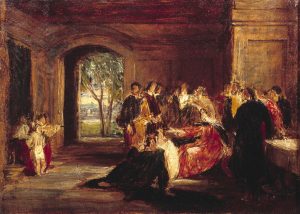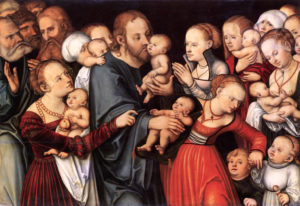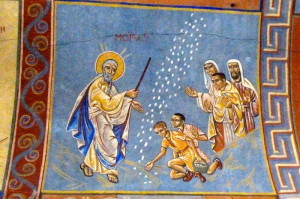Thoughts on Sunday’s Lessons for Sept. 26, 2021
First Reading (Track One): Esther 7:1-6, 9-10; 9:20-22
Take note of this reading, as this is the only time during the three year Lectionary period that we hear a reading from the book of Esther … and even this is only for those following Track One!

Sketch for Christ Rebuking His Disciples (c.1858), oil painting on canvas by Charles Robert Leslie (1794-1859). Tate Gallery, London. (Click image to enlarge.)
We come in just in time to hear the end of this story that, in Jewish tradition, is read in its entirety on the feast of Purim. Esther is the only book in the entire Bible that doesn’t mention God, but it tells a stirring legend of the Jewish people. In these verses Queen Esther of Persia reveals at a banquet feast that she is Jewish and would herself be killed with her people if the wicked Haman carried out his plan to kill or enslave all of Persia’s Jews. The angry king orders Haman hanged on a giant gallows, and justice is served. This event is remembered in Jewish tradition with feasting, joy, and gifts of food for each other and the poor.
First Reading (Track Two): Numbers 11:4-6, 10-16, 24-29
Sometimes the story of the Israelites wandering with Moses in the desert seems like an ancient reality show. Freed from slavery in Egypt by God’s mighty hand, the people complain because they miss the good food that they used to enjoy. This gets an angry response from God that prompts Moses to bark back. Then, two men who had remained in the camp start prophesying without supervision! A young man runs to tell on them, and Moses’ assistant Joshua wants them punished. But Moses says no: He only wishes that all the people could prophesy and share God’s spirit! A few moments after this reading, we hear a similar story in the Gospel from Mark.
Psalm (Track One): Psalm 124
Recalling a time when Israel feared death at the hands of enemies, Psalm 124 sings joyous thanksgiving for God’s protection in parting the waters of the Red Sea so the people could escape Pharaoh’s bondage in Egypt. If God had not been on their side when the enemies rose up against them, the Psalmist exults, the waters would have overwhelmed them! The torrent would have gone over them! But God did not give them up. They escaped, singing, “Our help is in the Name of the Lord, the Maker of Heaven and Earth.”
Psalm (Track Two): Psalm 19:7-14
These verses from Psalm 19 urge us to pray, and tells us why we should: God’s commandments are good, and it is good for us to follow them. The Psalm ends with a familiar exhortation that preachers often offer at the beginning of a sermon, and that we might all do well to ponder when we begin to pray: “Let the words of my mouth and the meditation of my heart be acceptable to you, O Lord, my rock and my redeemer.”
Second Reading: James 5:13-20
As we reach the end of our month-long visit with the letter of James, this powerful epistle has called on us to care for our neighbors, to protect the weak, and to do the work that God has given us to do. Now the letter ends with a call to prayer: Are we suffering? Pray! Are we happy? Sing hymns of praise! Are we sick? Ask our friends to pray for us! Prayer works. When we bring our brothers and sisters back to God’s way, we save them from death, the author of James says; for God works through us as God worked through the prophet Elijah when he prayed for an end to a killing drought and famine.
Gospel: Mark 9:38-50
The Apostle John seems angry and perhaps a little possessive. “Teacher, we saw someone casting out demons in your name, and we tried to stop him, because he was not following us,” he yells. We can imagine him running up to Jesus and demanding, “Make them stop! They’re not authorized!” But Jesus isn’t bothered. “Do not stop him,” he tells the apostles, adding, “Whoever is not against us is for us.” Jesus, perhaps using an old rabbinic tradition of contrasting an act with an extreme alternative, goes on with some pretty scary language about staying on the right path or else. But his point is clear: If people are with us, don’t throw them out.



